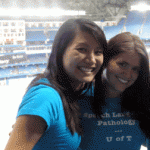Student Success Stories
What did four of our students have to say about choosing SLP at the University of Toronto? Read on to hear what Anna and Talia (co-Presidents of the Year 2 Class), Li and Heather (co-Presidents of the Year 1 Class) had to share about our program….
 Li Tang (left), Li Tang (left),Heather Molyneaux (right) |
Li pictured left completed a bachelor’s degree in health science at the University of Ottawa in 2010. Following graduation, she completed the Communicative Disorders Assistant (CDA) program at Georgian College (Barrie). As part of her CDA program she finished placements at the Toronto Rehabilitation Institute and the Aphasia Centre of Ottawa. An active volunteer, Li also worked at the Ottawa Children’s Treatment Centre and as a student ambassador for U Ottawa. Li’s original path was to go into teaching but her interest in SLP was sparked by observing a speech-language pathologist while volunteering at a preschool speech & language program. With many different areas of practice to choose from, Li feels that a degree in SLP will give her the flexibility to work with both children and adults with a wide variety of disorders. Fluent in Chinese and English, Li hopes to use both languages in her future clinical practice. |
| Heather completed her Bachelor of Arts degree at UWO. She was attracted to SLP when a family member was diagnosed with autism and she saw how speech-language therapy sessions made a difference. As part of her program, Heather completed an undergraduate research thesis on working memory in young children. In addition, Heather volunteered in Costa Rica and Guatemala where she grew in her understanding of the health care challenges facing underprivileged communities. An active volunteer, she started a student organization at Western to raise awareness of autism. Her SLP volunteer experience was completed at the Pathways Health Centre for Children (Sarnia), the London Speech and Language Centre, and the Autism Ontario Sarnia-Lambton Chapter. She hopes to work with children with developmental disorders in the future. |
Why did you choose U of T?
| Anna: I chose SLP at U of T because of the way it paired academic units with clinical units, and its location close to my parents’ home. I wanted to choose a program that was mindful about setting you up to succeed in the real world. SLP at U of T teaches coursework in pediatrics and immediately afterwards, we got to work with children in clinical settings. Because U of T was closer to home, I am able to save money and keep my debt load in check. | Talia: I chose to attend U of T because of its great reputation and for the opportunities living in the city of Toronto offered. Having the opportunity to meet and work with some of the top professionals in the field (in lectures and clinical placements) opens up countless learning and networking opportunities. The separation of academic and placement units was also a huge draw for me. Having these two components of the program during separate semesters allows me to put all of my energy into succeeding at each equally. I’m able to learn about specific elements of speech-language pathology and then immediately transfer what I learned into the real world. |
| Li: I chose U of T because I love Toronto. It is a very multicultural city and there is lots to do outside of class time. I am from Ottawa, and I have lived in the suburbs for most of my life so I really wanted a change of scenery. Being downtown and within walking distance of shops, restaurants, hospitals, festivals and more, really appealed to me. | Heather: I chose U of T because the unique curriculum allows me to understand classroom content before applying my learning in a clinical setting. Our clinical placements make up more than half our time in the program, so I know that at the end of two years I will have enough real-world experience to make me feel comfortable and confident in any work setting. I will spend my final placement in a developing country through the program’s partnership with the International Centre for Disability and Rehabilitation, which offers an exciting opportunity to travel and work! |
What do you like about SLP at U of T?
| Anna: There are two things that really stand out in my mind. First, I enjoy the faculty’s teaching style. They’re very knowledgeable in their respective fields and have done some amazing research that they have shared with us first-hand. The professors are all very generous with their time in allowing us to understand and apply the material to real world settings. (They’re also really funny.) Second, I like the large selection internship opportunities in Toronto and surrounding communities. Both of my internships were amazing. I really appreciated how helpful the clinical coordinator was. The clinical coordinator guided me through the process from matching me to a placement to helping me fill out my clinical hours tracking sheet. She even checked up on me mid-way through my placement to see how I was doing. | Talia: Having completed one year of the program, there are two things that I like most about the SLP program at U of T. First, the faculty are always available to help me when necessary and have been very welcoming throughout this journey. They have found an excellent balance between teaching us the fundamentals of speech and language, while emphasizing the importance of developing the clinical skills necessary to be strong and successful SLPs once we graduate. Second, my peers are outstanding. Coming from an undergraduate program that was highly competitive, I anticipated that a master’s program would be similar. I was wrong. My classmates and I work together frequently. We make sure that everyone understands new concepts and share resources we have found online or elsewhere. We have become a team and I am thrilled that my classmates will soon be my colleagues. |
| Li: I like how the program curriculum is set up, with our clinical placements following units of study of the same topic. It is very beneficial to apply what you’ve learned right after you’ve learned it. The SLP program at the University of Toronto is also well regarded, and I had heard great things about it from other SLPs I met while volunteering. | Heather: This is my first time living in a large city and I love getting together with my classmates and exploring the different neighbourhoods, visiting the major attractions and, sampling diverse foods! Not only are the students very supportive of one another, but the faculty and staff are always available and willing to listen and help. |
What do you dislike about SLP at U of T?
| Anna: The program is very structured and so there aren’t “electives” or “specialty areas” you can choose. | Talia: There is a lot of information to learn about each area of SLP. Sometimes it feels like there isn’t always enough time to learn everything I want to learn during the academic units. |
| Li: I dislike being so far away from home. But other than that, I haven’t found anything I dislike about U of T. However, I would like to see the establishment of a Speech & Hearing clinic as a part of U of T in the future. I think it would be neat to have students learn and do clinic rotations in the clinic on campus. | Heather: The only thing I dislike about the program is that during clinical placements I won’t be able to see my classmates as often as I do during our class time! |
What is the most important thing you did to prepare your application for SLP?
| Anna: The most important thing I did to prepare for my application was to go onto U of T’s website to look at their mission statement and values and to incorporate them into my Letter of Intent. Also, I think that completing all of my pre-requisites before applying was equally important. Because my undergraduate university did not have a phonetics course, I had to do some searching and advance planning to take it at another university. | Talia: The most important thing I did to prepare my application for SLP was to identify my strengths and qualities that made me a good candidate for the program. I knew that most applicants would have completed their prerequisites, volunteer hours, and reference letters. Therefore, I concentrated on making my letter of intent the most important aspect of the application. In my letter, I highlighted the attributes that made me an ideal candidate for the program. |
| Li: The most important thing I did to prepare my application was making sure I had enough variety in my SLP volunteer experience. These experiences taught me a great deal about speech & hearing and helped me discover new areas of SLP practice that I hadn’t considered previously, such as aphasia and AAC (augmentative and alternative communication). | Heather: I lived in Australia for a year after my undergraduate degree, so for me the most important part of preparing my SLP application was finding academic references. When I returned to Canada, I set up meetings with my former professors and brought my resume, a rough draft of my statement of intent, and samples of my academic work from their courses. I’m glad they remembered me and agreed to write my references! |
